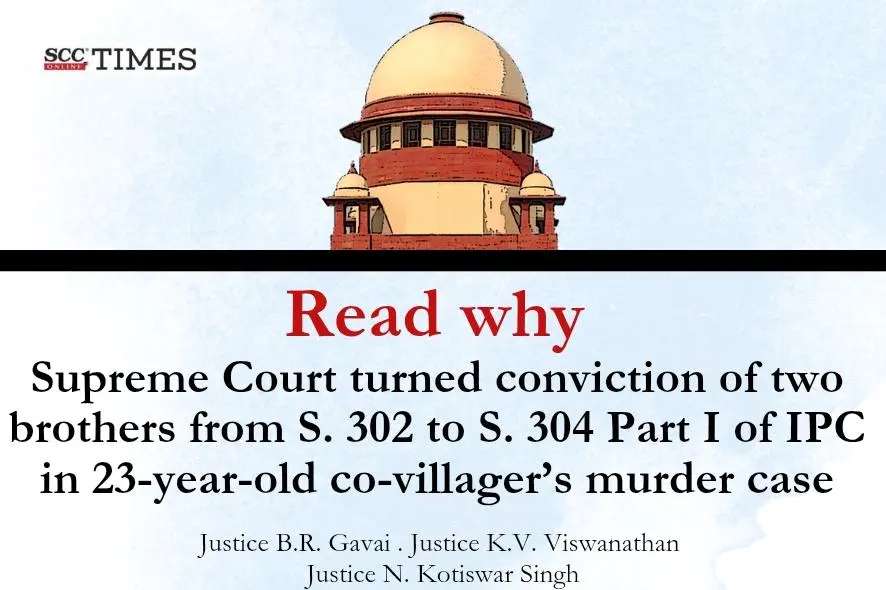Supreme Court: In a criminal appeal against a decision of the Chhattisgarh High Court, whereby the conviction and sentence imposed upon the present two convicts under Section 302 read with Section 34 of the Penal Code, 1860 (‘IPC’) was upheld, and the third accused (father of convicts) was acquitted, the Three-Judge Bench of BR Gavai, KV Viswanathan and N. Kotiswar Singh*, JJ. partly allowed the appeal and upheld the High Court’s view that there was no patent illegality in the Trial Court’s decision. However, the Court converted their conviction to under Part I of Section 304 of the IPC.
The Court said that the fact that the father of the convicts was acquitted would not warrant their acquittal as there was sufficient and cogent material evidence against them to prove the case beyond reasonable doubt.
Background
Following an altercation between the father of the two convicts/third accused on the previous night to the day of the incident, it was alleged that on 23-09-2001 the three accused assaulted the deceased with an axe and iron pipe. The father hit the deceased with fists and kicks and urged the two convicts, to kill the deceased. Thereafter, an FIR was registered under Section 307 of the IPC. The deceased was immediately rushed to the local hospital. Given the seriousness of the injuries, he was shifted to another hospital where he succumbed to his injuries. Subsequently, a charge under Section 302 of the IPC was added to the FIR.
The Trial Court convicted all three accused persons under Section 302 read with Section 34 of the IPC, and sentenced them to undergo rigorous imprisonment for life along with a fine of Rs. 10,000/- and in default of payment of such fine, each accused was directed to undergo additional rigorous imprisonment for three years in terms of the judgment. In an appeal, the High Court affirmed the conviction of the present two convicts and acquitted their father.
The convicts’ case before the Court was that they did not contest the case of the Prosecution that the deceased died on account of grievous injuries caused by sharp weapons, but that of ignorance of the death and also alibi, that they were in another village.
Analysis and Decision
Perusing the testimony of PW-6/ eye-witness, the Court noted that he did not deny the filing of the FIR, though he denied having mentioned the names of the three accused in the FIR during his testimony. The Court said that, during the trial, he refused his narration and turned hostile by not mentioning the names of any of the three accused in his testimony though he had specified them as the assailants in the FIR. While examining the credibility of the contents of the FIR, the Court said that even if it is assumed that he did not know the identity of the assailants/three accused and came to know from the talk in the village about the involvement of the accused, the fact that there was no talk of involvement of others who were not the present appellants assumed significance. The Court stated that the fact that there was no discussion of the involvement of persons other than the three accused spoke volumes about what had happened.
The Court also perused the examination and cross-examination of the mother of the deceased, who was also an eye-witness. The Court noted that she stated that she went to the police station and said that the two convicts had killed her son. The Court said that the mother of the deceased was busy getting proper treatment for her injured son and was not in the village till she returned after the death of her son and she was also present when the post-mortem examination was conducted. Therefore, if she was preoccupied with the treatment of her son soon after the incident and her statement under Section 161 of the CrPC could not be recorded earlier, it could not render her evidence untrustworthy, more so when her presence in the house when the incident occurred was proved by the evidence of PW-6, the informant, who is not a member of the family of the deceased.
The Court also stated that there was no reason as to why the mother of the victim should falsely implicate the two convicts without any rhyme or reason more so when there was no previous animosity of the mother with any of the convicts.
Conclusively, the Court viewed that, a hapless rustic illiterate woman visited with the vicissitude and tragedy of her son being fatally assaulted by co-villagers before her own eyes, had withstood intensive cross-examination and judicial scrutiny. She answered the questions put to her during her cross-examination with spontaneity without any jitteriness and her response was natural and not elusive and prevaricating, which all are signs of the truthfulness of the witness. Therefore, the Court held that her testimony was trustworthy and reliable.
Further, the Court noted that the weapons were recovered from the two convicts. The Court said that though the convicts took the plea that they were not in the village during the time of the incident and had gone to another place at Nayapara, to attend the housewarming ceremony and returned only in the evening, the defence did not lead any evidence about the plea of alibi.
On examining the injuries of the deceased, the Court noted that they were identified as grievous. The Court said that since the cause of death was coma because of the head injuries and it was opined that the injuries were sufficient in ordinary course of nature to cause death, it appeared that it is the cumulative effect of these head injuries. The Court stated that the deceased did not succumb to the injuries immediately and he died on the third day of the incident. Further, the Court added that the circumstances under which the assault took place and the reason for causing the injuries and the motive behind their assault was not defined. The Court also considered that it was not established that it was premeditated, and the assault was preplanned with the intention to kill the deceased. Hence, the Court decided on conversion of their conviction to Part I of Section 304 of the IPC. Thus, the Court held that the Prosecution was able to establish beyond reasonable doubt that the two convicts were responsible for the death of the deceased, for which they were convicted by the Trial Court under Section 302 of the IPC. The Court upheld the High Court’s decision holding that there was no glaring illegality or perversity in the findings arrived at the Trial Court. The Court said that the convicts had caused the death of the deceased fully knowing that the bodily injuries were likely to cause death, hence, the Court converted the conviction of the convicts from Section 302 of the IPC to Part I of Section 304 of the IPC.
CASE DETAILS
|
Citation: Appellants : Respondents : |
Advocates who appeared in this case For Petitioner(s): For Respondent(s): |
CORAM :










